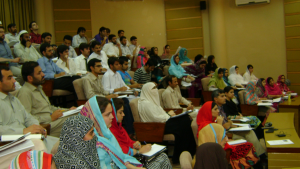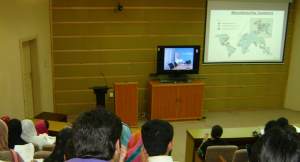
The INSPIRE Research Seminar Series I (2011) and Series II (2012)
December 21, 2012
by Lorraine Warren
The panel of speakers Prof. Sally Brailsford, Dr. Lorraine Warren, Dr. Mine Karatas-Ozkan and Dr. Ian Harwood from the University of Southampton, Dr. Robert Smith from the Robert Gordon University in Scotland and Dr. Saleem Gul from IMSciences. The seminars provided the first-ever opportunity for students of IMSciences to listen to and interact with researchers from UK and Pakistan on a range of topics including scoping a research project, grounded theory, use of management science research in healthcare, establishing quality in qualitative research, theory building in qualitative research and documentary research. Due to extremely popular demand, the seminar series has now become a permanent feature of the academic calendar with Series III being planned for 2013.
“INSPIRE”-ing for Knowledge Exchange and Research
December 21, 2012
by Lorraine Warren
The HEC-British Council funded International Strategic Partnership in Research and Education (INSPIRE) is in its second year of implementation at IMSciences. Rooted in the IMSciences’ academic linkage with the University of Southampton UK that was established in 2007, for the first-ever Split-Site PhD program in Pakistan, the project ascends this relationship to new levels by focusing on joint research, doctoral studies, curriculum development, faculty exchange and outreach. This far-reaching vision has seen to two faculty members (from IMSciences) at the brink of completing year 1 of their PhD program. Chosen after a thorough and intensive selection procedure the candidates are steadily moving towards completion of their studies in the disciplines of innovation and entrepreneurship giving a much-needed boost to academic diversity at the institute.
INSPIRE has also seen to the formation of an International Research Group (IRG) with faculty members from both partner HEIs. Under IRG’s umbrella, joint research is being carried out on “innovation and sustainable entrepreneurship” – which also happens to be the main theme of the project. This joint research intends to minutely focus on the native and prominent leather and gemstone sectors of Khyber Pakhtunkhwa. As part of the project’s outcomes, research papers are to be submitted to different international conferences as well as subsequent publications in high-ranking academic journals by the start of 2014 further contributing to the institute’s emerging research focus.
Trail-blazing forward, in curriculum development, “Innovation and Entrepreneurship” will be introduced as a separate specialization track in the BBA and MS Management programs through a phased approach. The relevant course syllabi finalized in collaboration with the University of Southampton are to be submitted for formal approval at IMSciences by early 2013.
Under INSPIRE, two International Research Seminar Series were also organized for students in 2011-12. A total of seven seminars were conducted through video conferencing by academics of international repute – see next post for details of the seminar series
Owing to the continued success of INSPIRE, the British Council has further extended the knowledge exchange focus of the project by approving SPEKE (Strategic Partnership Extension: Knowledge Exchange) for IMSciences. SPEKE is hence, the second project, which builds upon the outcomes of INSPIRE. It focuses on strengthening knowledge exchange through skills development and enterprise for small businesses and students in north-west Pakistan. The project will enter its implementation phase during the second half of 2013.
It’s about Exchange, not Transfer: Sustainable Entrepreneurship and Innovation in Khyber Pakhtunkhwa (North West Pakistan)
December 19, 2012
by Lorraine Warren
In recent times, the province of Khyber Pakhtunkhwa (or North West Pakistan) has had the misfortune of making headlines for all the wrong reasons, including ongoing conflict and damaging floods. Yet the province has so much more to offer, in terms of culture and also in the field of enterprise development, with small business sectors rich in potential, particularly leather, jewellery, furniture, marble and agriculture.
As Principal Investigator on the UK side of INSPIRE, I’m responsible for the team delivering on the idea of knowledge exchange for sustainable entrepreneurship and innovation in Khyber Pakhtunkhwa (KP). INSPIRE (www.soton.ac.uk/.inspire) is a Strategic Partnership between the University of Southampton’s School of Management (UK) and the Institute of Management Sciences (IMSciences), in Peshawar (North West Pakistan), which is supported by the British Council and the Higher Education Council in Pakistan. This international partnership has been created to support new teaching initiatives, new research projects and enterprise development with IMSciences, Peshawar in these subject areas, which have been chosen because small and medium enterprises in Pakistan, particularly in the north-west region, have traditionally struggled to perform well.
IMSciences, Peshawar is the foremost business school in KP and a leading institute of Pakistan in management and business education. It seeks to contribute to the uplift of a conflict-ridden and economically unstable region by equipping its graduates with skills that can help them function as successful professionals and entrepreneurs. This project seeks to establish the Institute as the principal resource for the students as well as the SME industry in the region for teaching, learning and for the development of necessary new knowledge and applied research. The University of Southampton’s School of Management is home to the Research Centre for Strategic Innovation (www.soton.ac.uk/csi) with specific interests in developing countries, non profit and creative industries that serve the context well, as well as teaching and outreach strengths.
It has always been at the forefront of our project thinking that INSPIRE is about knowledge exchange and not knowledge transfer. It is well-known that entrepreneurship and innovation are deeply embedded systemic activities that rely on complex culturally mediated interactions between individuals, regulatory institutions and the financial context. As for many other interventions, efforts that rely on ‘parachuting in’ knowledge or structures from elsewhere are almost certainly doomed to failure. Thus, the mechanisms which we have used in the project rely heavily on interactions that ensure a two-way flow of information. These include split site PhDs (student spends 3 months at Southampton each year, while remaining employed at IMSciences, jointly supervised), joint research projects, , curriculum development, and shared outreach initiatives. In each case, we ensure that work is grounded in the KP context. The current PhD students for example are working on non-profits in the region, and the new Offices of Research, Innovation and Commercialization which have been set up nationally, but impact regionally. A joint research project takes a more strategic view, examining the link between HE institutions, governments and business in the region. Curriculum development has drawn on the context of our Masters and Undergraduate units and courses, but these are provided as vehicles for discussion and development, to be validated through local procedures and considered in the context of local markets, not as ‘bought in’. This process too will be documented and evaluated. Of course, we also included staff exchanges between the two countries, to consolidate our efforts but while there has been plenty of travel from Pakistan to the UK unfortunately the trips from the UK side have been prevented by travel difficulties and insurance reasons – leading to heavy usage of vidcon and skype! Additionally, we sometimes meet on neutral ground, such as at the EURAM conference in Rotterdam and in future, at Going Global 2013 in Dubai.
This approach should benefit both institutions. IMSciences should increase its research capacity, research income and develop new connections on the international stage, drawing on Southampton’s extensive linkages. Their students and faculty will gain international exposure and a range of new skills in teaching, research and enterprise development. In the longer term, the project aims to increase the number of start-ups in the region, and eventually improve SME performance. Of course, successful practice will be identified and evaluated and hopefully recognised as useful by other institutions in the region.
For the University of Southampton, the project seeks to enhance the already existing relationship with the Institute of Management Sciences established in 2006. The benefits include long-term academic engagements with a business school in a poor and underdeveloped part of the world, further opportunities for quality research research in an international context and the enrichment that comes from exposure to a new culture. The interaction provides new knowledge in the form of research outcomes, teaching material such as case studies and numerous networking opportunities in the virtual world. Looking to the future, we hope engender proposals concerning the sustainability, governance, leadership, and development of SMEs in KP.


